Last updated on December 30th, 2023 at 02:48 pm
Vocal microphones for live shows have been around for decades now, and the one leading the pack has always been the Shure SM58.
Now, it is an absolute beast of a microphone, but there are other alternatives that you should also consider, especially since some other mics, like the AKG D5, also provide a lot of value and don’t cost more.
In this post I will compare both the SM58 and the D5 to give you a better understanding of which one you should go for depending on your needs.
If you just want to read the basic differences between both of them, then you’ll find them at the end of the post.
Let’s get started with…
Shure SM58
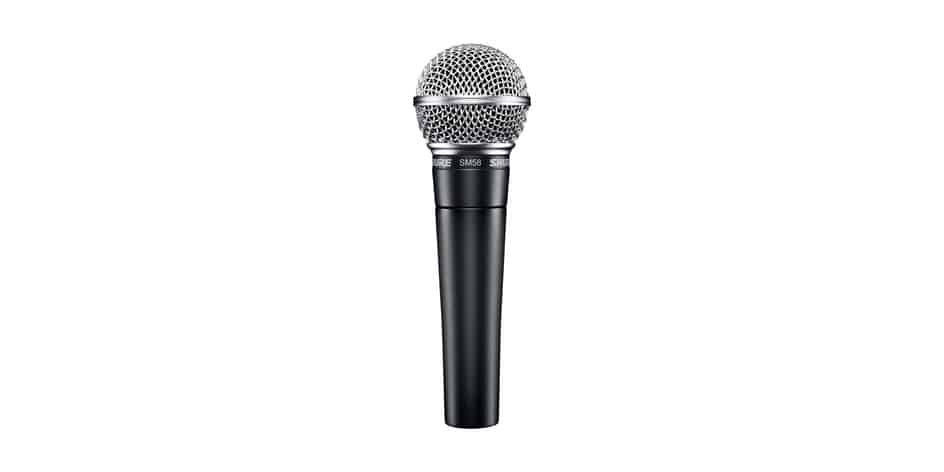
The Shure SM58 is the Nr.1 vocal microphone in history; for live shows, studio sessions, live speeches, you name it.
There are actually four different versions of the SM58;
- SM58-CN (Cable included).
- SM58-LC (Cable not included).
- SM58S (On/Off Switch included).
- SM58-X2U (With XLR to USB adapter).
Which one you prefer totally depends on you, but the quality of the mic will be exactly the same no matter which version you decide to go for.
The reason that the SM58 is considered to be one of the- of THEE best vocal mic in history, is because of how reliable it is and its excellent sound quality.
Not only that, but it’s extremely affordable as well.
Now, most people also get confused on the differences between the SM58 and the SM57, which is why I wrote another post addressing this… So, feel free to check it out as well.
Taking a look at its build quality you’ll see that it’s built like an absolute tank; The all-metal body and grille really give it a nice feel to it, plus it’s actually quite heavy, which I like.
The great thing about all the Shure Dynamic mics is that they are prepared for live usage, meaning that they are meant to be able to withstand almost anything you throw at them:
Did you drop it on the ground, step on it, spit on it… hit someone on the head with it?… (Hopefully not), the Shure SM58 will just keep on working like nothing has happened.
How does it perform?
As far as sound quality goes; it is fantastic! Especially considering that it sells for about $100.
When looking at the frequency response of the SM58 (50Hz to 15kHz), you will notice that it features a slight boost in the upper mids, or presence area.
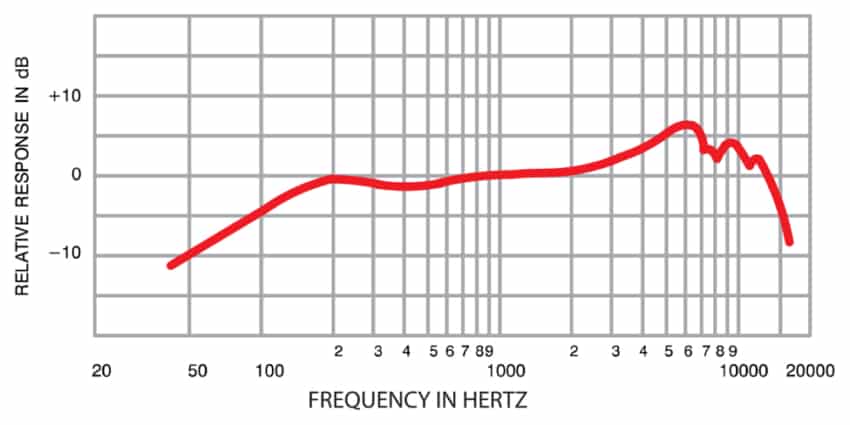
This is intentional and serves the purpose of making it easier for the vocals to cut through the mix without the need for EQ, or as much at least.
This boost also gives the vocals a bit more clarity and brightness.
As far as handling noise goes, it’s not bad at all. I mean, there’s a reason why it’s the go-to live vocal mic, and handling noise definitely plays a big part in that.
The SM58 can also handle feedback quite well, but if you want another microphone that does this insanely well, then you should have a look at the Heil PR35.
You can find that one in my recommended gear page if you’re interested in learning more about it.
Now, when recording acoustic- and electric guitars, I did like it quite a bit, especially for mic-ing up cabinets.
The reason for this is that it’s almost identical to the SM57, which was designed for mic-ing up cabinets, and other instruments from a very close distance.
Lastly, the Shure SM58 can be used for both live shows and studio recordings; In fact, some of the best-known albums in history were recorded using SM58’s.
What comes in the Box?
- The Shure SM58 Microphone
- Microphone Clip
- Storage Pouch
Features
- Most famous vocal microphone in the world
- Perfect for studios and live shows
- The grille acts as a pop filter
- Built like a tank
Specifications
| Polar Pattern | Cardioid |
| Microphone type | Dynamic |
| Frequency Response | 50 to 15,000 Hz |
| Output Impedance | Rated impedance is 150 Ohms (300 Ohms actual) |
| Connector | Three-pin (XLR), male |
| Sensitivity | -57.5dB |
Find out more about the Shure SM58 here:
- Shure SM58: Amazon, Sweetwater.
P.S. Another great alternative, especially if you’re on a budget, would be the SM48 since it sells for about 1/3 the price of the SM58.
Moving on…
AKG D5

AKG, despite not being AS well-known as Shure, still creates microphones that definitely are at the same level.
One of their best-known ones is the AKG D5 which is a Supercardioid microphone, meaning that it will reject almost all the sound that isn’t coming from the front.
Since the SM58 has a cardioid polar pattern, you could say that the AKG D5 is more directional and has a more focused pickup pattern.
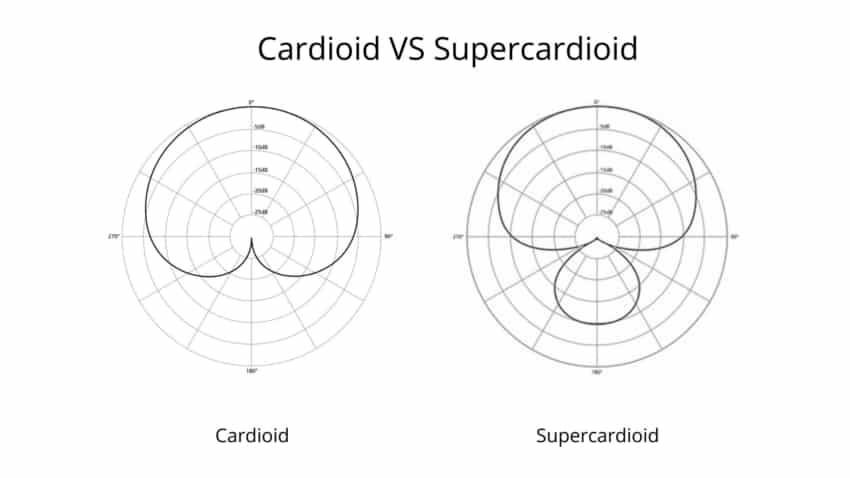
As far as the build quality goes, it’s almost identical to the SM58; The body and grille are all metal and it’s designed to last.
It should withstand the life on the road and everything that happens on a live environment, so no worries here.
The AKG D5 is also extremely affordable; in fact, it sells for roughly the same as the SM58, which means that choosing between one or the other would mostly have to do with the difference in sound quality.
So, let’s get straight to that…
How does it Perform?
The supercardioid polar pattern is awesome; The off-axis rejection is much better than on microphones with a cardioid pattern, like the SM58.
This is ideal for live settings since it means that feedback will be less of an issue as well as picking up any background noise.
Now, when recording acoustic- and electric guitars, the sound quality wasn’t too good, which makes sense since it’s a microphone designed to be used only for vocals (I would much rather use the SM58 for this).
Note: If you truly want to record high-quality acoustic guitar tracks, then you’ll need a couple stereo pair microphones since that’s the best way to achieve a good sound.
Similar to the SM58, the D5 has a pretty hefty boost to its high mids/presence frequencies that should help the vocals sound better in a mix or in a live setting.
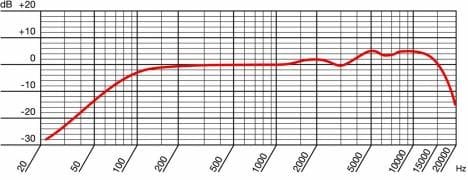
The difference is that the D5 actually has an even bigger boost, and this could bring out some harshness from time to time.
However, this will completely depend on the source you’re recording.
All in all, The AKG D5 is an excellent vocal mic, especially if you want to avoid feedback and background noise as much as possible and if you like the mid/high-end boost.
What comes in the Box?
- The AKG D5 Microphone
- Microphone Clip
- Storage Pouch
Note: You can get a bundle with a cable and a mic stand for exactly the same price.
Features
- Built to last forever
- Supercardioid polar pattern
- Boosted high-end
Specifications
| Polar Pattern | Supercardioid |
| Microphone type | Dynamic |
| Frequency Response | 70 to 20,000 Hz |
| Output Impedance | Impedance <= 600 ohms |
| Connector | Three-pin (XLR), male |
| Sensitivity | -51.7dB |
Find out more about the AKG D5 here:
- AKG D5: Amazon, Sweetwater.
What are the differences?
Like I just mentioned earlier, the Shure SM58 has a more “narrow” frequency response (50Hz to 15kHz), while the one of the D5 goes from 70Hz all the way up to 20kHz.
This doesn’t necessarily mean that the audio quality of the D5 is going to be better, simply that it can pick up frequencies that go past 15kHz.
Both microphones sound extremely good, especially for vocals, but I think that the D5 has a bit more Top-end content to it thanks to the high-end boost.
Now, when recording instruments, I didn’t like the sound of the D5 as much; I’d rather stick to the SM58 here.
Differences between the SM58 and the AKG D5
The AKG D5 has a more Pronounced top-end than the SM58, a wider frequency response (70Hz to 20kHz, instead of 50Hz to 15kHz), and it features a supercardioid polar-pattern which is better at off-axis rejection and feedback control.
The sound quality is very similar, but the SM58 is better for recording instruments, making it more versatile.
Which one should you choose?
I personally prefer the SM58 simply because I find that recording acoustic guitars and cabinets just works a bit better, making it more versatile.
Now, if you already have that part covered because you use a good condenser microphone or a stereo pair to record instruments, then the D5 might be a better choice, especially for live performances thanks to its supercardioid polar pattern.
So, if you need a mic ONLY for live singing, then go with the AKG D5.
If you want a microphone that’s also great for live shows and which offers a bit extra versatility, then the Shure SM58 is a great alternative.
What you will need in order to use these microphones
Almost every microphone, except USB ones, need an Audio Interface or a Mixer to work properly since they come with preamps that can increase the signal coming from the mic to be usable.
Even the most affordable interfaces out there are capable of this, so here’s a list of articles about Audio Interfaces and Mixers which you should check out if you still need to purchase one.
- Scarlett 2i2 VS UMC204HD
- Behringer UM2 VS UMC22
- Scarlett 2i2 VS Audient iD4
- Mixers with USB Multi-Track capabilities
- Wireless Multi-Track Mixers
Conclusion
Both microphones are excellent, and I mean EXCELLENT!
You can definitely use both of them for live performances and studio recordings, even recording instruments.
However, like I mentioned earlier, I prefer the SM58 for mic-ing up cabinets, recording acoustic guitar, etc., and in a studio setting, the supercardioid polar pattern won’t be as useful since there isn’t too much background noise.
For live singing, on the other hand, the D5 can work tremendously well, especially if you’ve had feedback issues in the past.
I hope this information was useful!
Have a wonderful day!
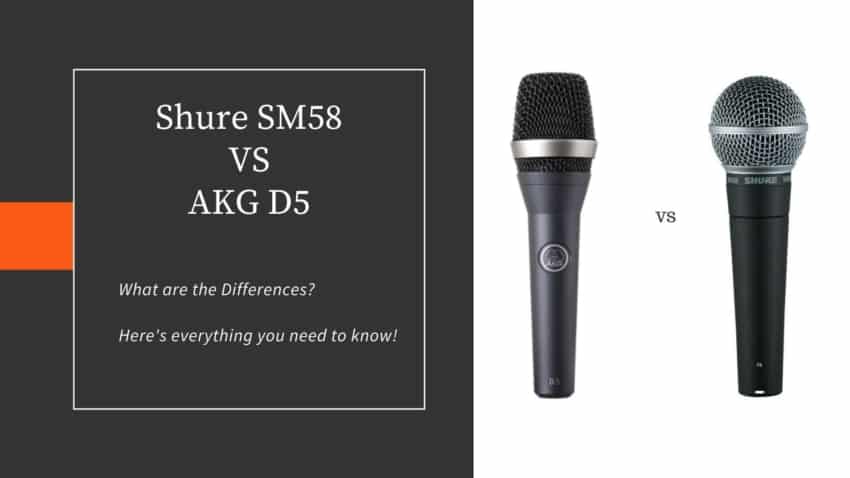
Thank you for such a nice comparison.
Thank you Facundo, will be purchasing a new microphone and was trying
to figure out which mic to go with. Either going to be a Shure, Sennheiser
or AKG. As I don’t do much recording, mostly singing through a Boss Acoustic Pro Singer amp I will be going with the AKG. Thanks again.
Stay safe.
Dave